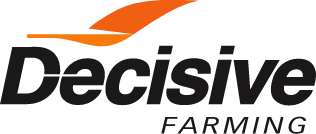Knowledge is power, especially with all the information precision agronomy has to offer. The most successful plans – from crop rotation to soil zone management, crop nutrients and fertilizer strategy – leverage that knowledge to continuously improve economic and environmental sustainability on your farm.
One of your most powerful tools is the collection and understanding of good data. “Having sound data, you can make decisions on how to fertilize certain areas of your field or what seed rates are needed to help increase your return on investment,” says Garth Donald, Decisive Farming co-founder and manager of agronomy. “This kind of information allows you to make the best decision of what you want to grow in subsequent years to try and gain the best overall return on investment.”
When it comes to managing and applying all that information for your farm’s plans today, tomorrow and beyond, insight and hindsight can bring 20-20 vision for the best decision making. When you have a second set of eyes, it’s even more clear.
Keep improving
With Performance Insights, Decisive Farming’s team of agronomy experts work with you to more deeply explore the quantitative performance across your farm. The program streamlines all that data so you can apply it proactively and efficiently while saving valuable time and effort.
This collaborative process connects your knowledge of your fields with skilled agronomic expertise and advisement for better understanding across your farm. Working together takes better advantage of variable rate (VR) technologies and soil testing data to identify differing soil characteristics, disease pressure or soil fertility challenges at the zonal level. Together, you can take all that detail and apply it across the larger picture of your entire farm. You’ll invest where it matters most, increase nutrient uptake, decrease wasted inputs and boost your farm’s overall revenue.
“The farmers who are excited about VR are looking for ways to continue to aggressively take on the world in conjunction with the 4Rs,” says Andrea Bilodeau, Decisive Farming senior agrologist. “Performance Insights is a great piece and part of the conversation and how we do that. We focus on the areas of the field the farmer can make shine, open up a conversation around why some are lower yielding, and how to maximize on the investment being put out there.”
That includes configuring your equipment and linking all your systems for convenient information access you can trust. “Having a complete calibrated data set from a combine can be a valuable tool in identifying places of concern more specifically,” says Bilodeau.
Accurate as-applied records around your pesticide and in-crop applications also mean you can more effectively react to changes in more precise ways that minimize disruption to the rest of your crop plan. “As-applied records give you a history of what you applied so you can go back in the growing season to make sure that application actually worked for what you were applying it for,” says Donald. “Once you have a digital copy of that data, it allows you to make decisions going forward around what you can grow, or what you may need to grow.”
Farm-wide, in-depth analysis
As the season wraps, you can validate or adjust your plans with a deep delve into your farm’s performance to discover what’s working and where the best opportunities for improvement lie. At Decisive Farming, this in-depth exploration is your annual Harvest Review.
“The Harvest Review allows us to sit down frankly with customers and have a really incredible conversation,” says Bilodeau. “Sitting down and evaluating each field to this level and having someone discuss what all this data really means is different for them.”
This discussion creates a clear vision around factors at play including your yield variability, production expenses and historical performance as you work together to see patterns and make assessments for growth and efficiency. “Data collection gives farmers a yearly dataset of which products they use, but it also creates a history,” says Donald. “You can go back and understand whether what you did worked or not.”
Going forward, these records make for the best rotation decisions. “Maybe you stretch them out a bit and limit certain crops,” says Bilodeau. “It may also give you an opportunity and better knowledge in terms of the varieties you’re choosing.”
That different perspective around field performance drives stronger management decisions. For example, “Did areas of long-time poor performance respond to how you treated them?” says Donald. “If they did not, you can create a new plan moving forward by using data as opposed to guessing or trial and error.”
Collaborative insights and reviews are powerful tools to continuously improve performance on your farm. “We have this incredible overview of where we started this process, where we ended it and how we’re going to continue forward,” says Bilodeau. “It creates this wonderful conversation with our farmers about their goals and strategies for improving on their farms. That’s the biggest thing.”


